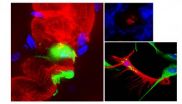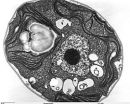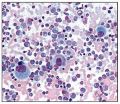This conference is part of our 2nd Novel Cancer Therapeutics Summit which consists of two other concurrent conferences shown below: 2nd Novel Cancer Therapeutics Summit: Track: 4th Cancer Targets & Therapeutics Track: 2nd Oncology Partnering & Deal-making Track: 3rd Ubiquitin Research & Drug Discovery END
Pandemic vaccination did not increase risk of fetal death
2013-01-17
(Press-News.org) With the rapid progression of molecular biology and genetics, and the subsequent emergence of many new targets, emerging targets & therapeutics provides new opportunities for the prevention and treatment of several major disease systems. The 4th Cancer Targets & Therapeutics Conference, taking place on February 25-26, 2013 in Las Vegas, NV will continue to be a premier event for translational researchers, preclinical scientists and managers, and those carrying out early phase clinical trials, working to identify and exploit advances in the field in order to deliver products with a meaningful clinical impact. Both cutting-edge researchers and those who guide its commercial development will be on-hand to share their knowledge and insights as to how therapeutic cancer targets are identified, and how this research translates into meaningful therapeutics that benefit patients living with cancer.
Attendees will learn about:
Important progress in key aspects of antibody, vaccine, and cell-based therapies being developed and evaluated in clinical trials for the immunotherapy of cancer
How cellular pathways of protein processing and pivotal cell-death pathways are being targeted by new Therapies
New therapeutic targets in epigenetic and newly described metabolic pathways that serve as new pathways for drug discovery
Advances in targeting angiogenesis
Important new animal models for target validation
New approaches to drug-conjugates and to dose evaluation for effective therapy
Preliminary Sessions for 2013 Agenda:
Novel Kinase Inhibitors & Beyond the Kinome
Functional Genomics & Future Cancer targets
Novel Antibody-based Modalities
Progress in Cancer Immunotherapy
Cancer Stem Cells, Metabolism, Cancer Epigenetics
Novel Advances & Technologies in Oncology
###
ELSE PRESS RELEASES FROM THIS DATE:
Photovoltaics beat biofuels at converting sun's energy to miles driven
2013-01-17
In 2005, President George W. Bush and American corn farmers saw corn ethanol as a promising fossil fuel substitute that would reduce both American dependence on foreign oil and greenhouse gas emissions. Accordingly, the 2005 energy bill mandated that 4 billion gallons of renewable fuel be added to the gasoline supply in 2006. That rose to 4.7 billion gallons in 2007 and 7.5 billion in 2012.
Since then, life cycle assessments (LCAs) have shown that corn ethanol has modest if any effect on reducing CO2 emissions and may actually increase them, while posing a threat to natural ...
New research throws doubt on earlier 'killer walrus' claims
2013-01-17
Palaeontologists who examined a new fossil found in southern California have thrown doubt on earlier claims that a "killer walrus" once existed.
Geology PhD student Robert Boessenecker from New Zealand's University of Otago and co-author Morgan Churchill from the University of Wyoming have today published their paper about the fossil in the online scientific journal PLOS ONE.
The paper reports that the new fossil-find, of the extinct walrus Pelagiarctos from southern California, prompts a different hypothesis to an earlier one that a "killer walrus" existed, preying ...
New study examines post-Roe v. Wade arrests of and forced interventions on pregnant women
2013-01-17
"Arrests of and Forced Interventions on Pregnant Women in the United States, 1973-2005: Implications for Women's Legal Status and Public Health," an article by Lynn M. Paltrow and Jeanne Flavin in the Journal of Health Politics, Policy and Law (volume 38, issue 2), offers a groundbreaking, in-depth look at criminal and civil cases in which a woman's pregnancy was a deciding factor leading to attempted and actual deprivations of her physical liberty.
As "personhood" measures are promoted and the fortieth anniversary of Roe v. Wade approaches, this article broadens the ...
Quail really know their camouflage
2013-01-17
When it comes to camouflage, ground-nesting Japanese quail are experts. That's based on new evidence published online on January 17 in Current Biology that mother quail "know" the patterning of their own eggs and choose laying spots to hide them best.
"Not only are the eggs camouflaged, but the birds choose to lay their eggs on a substrate that maximizes camouflage," said P. George Lovell of Abertay University and the University of St Andrews. "Furthermore, the maximization seems specific to individual birds."
Karen Spencer, also of University of St Andrews and a co-author, ...
New insights into how leprosy infection spreads could pave the way for early intervention
2013-01-17
Leprosy is a bacterial disease that spreads to muscles and other tissues in the body, causing neurodegeneration and muscle weakness. A new study, published by Cell Press January 17th in the journal Cell, reveals that the bacteria responsible for leprosy spread infection by hijacking specialized cells in the adult nervous system, reprogramming them into a stem cell-like state, and converting them to muscle-like cells. These findings could lead to the development of new therapeutic strategies for combating bacterial infections and degenerative diseases as well as new tools ...
Learning the alphabet of gene control
2013-01-17
Scientists at Karolinska Institutet in Sweden have made a large step towards the understanding of how human genes are regulated. In a new study, published in the journal Cell, they identified the DNA sequences that bind to over four hundred proteins that control expression of genes. This knowledge is required for understanding of how differences in genomes of individuals affect their risk to develop disease.
After the human genome was sequenced in 2000, it was hoped that the knowledge of the entire sequence of human DNA could rapidly be translated to medical benefits ...
Cancer mortality down 20 percent from 1991 peak
2013-01-17
Atlanta– Jan. 17, 2013–As of 2009, the overall death rate for cancer in the United States had declined 20 percent from its peak in 1991, translating to the avoidance of approximately 1.2 million deaths from cancer, 152,900 of these in 2009 alone. These figures come from the American Cancer Society's annual Cancer Statistics report, one of the most widely-cited medical publications in the world.
Each year, the American Cancer Society estimates the numbers of new cancer cases and deaths expected in the United States in the current year and compiles the most recent data ...
How cells know when it's time to eat themselves
2013-01-17
Researchers at the University of California, San Diego School of Medicine have identified a molecular mechanism regulating autophagy, a fundamental stress response used by cells to help ensure their survival in adverse conditions.
The findings are published online in the January 17 issue of Cell.
Senior author Kun-Liang Guan, PhD, a professor of pharmacology at UC San Diego Moores Cancer Center, and colleagues report that an enzyme called AMPK, typically involved in sensing and modulating energy use in cells, also regulates autophagic enzymes.
Autophagy, which derives ...
Drug targets hard-to-reach leukemia stem cells responsible for relapses
2013-01-17
Researchers at the University of California, San Diego School of Medicine have discovered that hard-to-reach, drug-resistant leukemia stem cells (LSCs) that overexpress multiple pro-survival protein forms are sensitive – and thus vulnerable – to a novel cancer stem cell-targeting drug currently under development.
The findings, published in the January 17 online issue of Cell Stem Cell, open the possibility that diseases like chronic myeloid leukemia (CML) and some solid tumor cancers might – in combination with other therapies – be more effectively treated with this ...
Mount Sinai researchers discover how the flu virus tells time
2013-01-17
Scientists have discovered that that the flu virus can essentially tell time, thereby giving scientists the ability to reset the virus' clock and combat it in more effective ways. According to researchers at the Icahn School of Medicine at Mount Sinai, the flu knows how much time it has to multiply, infect other cells, and spread to another human being. If it leaves a cell too soon, the virus is too weak. If it leaves too late, the immune system has time to kill the virus.
The finding provides a novel design platform for the flu vaccine and could lead to new antiviral ...




